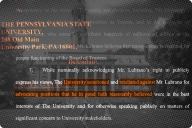You have /5 articles left.
Sign up for a free account or log in.
What do Amazon, Google, Facebook, I.S.P.s and most Internet corporations have in common? They are all private, for-profit corporations.
What does the Constitution promise or protect? Government action. And since the twentieth century, via the legal doctrine of incorporation, all government action, including state and local, not just federal government action as was the original intent and meaning of the founders.
Why are these facts of interest? Because cyberspace is the most dynamic venue for speech and the global marketplace of ideas ... and yet most of its top and bottom layers, applications and physical connectivity, belong to private corporations. (Logical layer, by virtue of government development, the tcp/ip protocols, are in the public domain.)
The upshot: a conundrum for free speech and possibly other constitutional concerns. Private corporations have no first amendment obligations. In the agrian days, when corporations were a new and fledgling concept in American culture and society, that worked out just fine for the most part. The public domain was literally the town square, where ideas and discourse flourished. In the era before incorporation, either or both federal or state constitutions protected speech. Early nineteenth century public policy favored the development of corporations. Case law bent the same way, giving them land and water rights even against the grain of more traditional notions of public land rights, but only so long as those private property rights in practice promoted commerce; when and where the effect was a monopoly (like that which the crown had exercised before the Revolution in the commercial sector), the courts leaned toward free trade. But increasingly the notion of what was a public good shifted from public domain to the private corporate interest in the belief that the creation of wealth best benefited the society.
We still live in that ideology; it is primarily still the public economic policy of the United States today to favor corporate interests whether it be in tax or Internet law. But too infrequently advocates advance those positions without accessing how and in what ways the environmental, economic, social, political landscape has changed. The United States is now a fully developed country and most of the world is on that same military-industrial complex trajectory individually, as is the case for China, India and Pakistan, in association with "superpowers" as is the case of both North Korea and South Korea and Japan (the former with China and the latter two with the U.S.) or is a rouge outside the main (Afghanistan, frankly).
The exploitation of resources has placed us at a critical global juncture environmentally; industrialization created a new social order of factory laborers; that system helped to bequeathed to the twentieth-century the fodder of two major world wars and any number of global skirmishes that continue to animate foreign policy today. Politically the assumption that democracy is the ubiquitous answer to governance is under severe scrutiny from countries and cultures abroad who have a very different history when it comes to governance and social order -- China for example -- and from within our own society: just listen to the lyrics of Kayne West's "Lost to the World." This song, one of the greats of Hip Hop and of this decade, ends with an indictment of foundational concepts in American political culture such as "freedom" and "democracy."
My point? Any number of new issues whether it be Amazon dropping wiki leaks to myriad privacy concerns bubbling up over Google to the criteria by which Facebook decides to delete material point to an unspoken problem: private interests control speech globally.
And nobody seems to recognize the challenge inherent in that paradigm: if the Internet world in which we now live is no longer governed by the principles of free speech but the profit motive, then we have a lot to talk about ... while there is still time, awareness of the challenge and the appetite for a more profound foundational support for expression than that which is driven by the bottom line.






